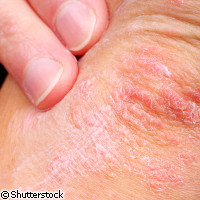Scientists identify genetic risk factor for common skin condition
Scientists have identified a genetic variant that appears to be linked to an increased risk of developing the skin condition atopic dermatitis. The researchers hope their findings will lead to the discovery of new drugs to treat this chronic condition. The research, which is published online by the journal Nature Genetics, was supported in part by a Marie Curie researcher mobility grant from the EU. Atopic dermatitis, also known as atopic or infantile eczema, affects around 15% of young people in industrialised countries, making it one of the most common allergic disorders. Symptoms include dry, itchy, reddened skin, often on the inside of the elbows and on the back of the knees. These sore areas may also 'weep' clear fluid, and in the worst cases, the skin may become thicker. Emollient creams can help to alleviate the symptoms, but an effective cure is urgently needed. The question of what causes a flare-up of atopic dermatitis has still not been fully answered. Environmental factors, including allergens and even certain skincare products, for example, play an important role. Meanwhile, epidemiological studies suggest that genetic factors may strongly influence an individual's risk of developing the condition. In this latest study, scientists from the Czech Republic, Germany, France and Poland identified a genetic variant that is associated with an increased risk of atopic dermatitis. According to the researchers, 13% of Europeans carry two copies of the variant; these people are 1.47 times more likely to develop atopic dermatitis than those who do not have the variant. People carrying just one copy of the variant are 1.16 times more likely to have the condition than non-carriers. The genetic variant in question lies in the same region of DNA as a gene responsible for the production of a protein called EMSY. The scientists suspect that a mutation in this gene could be associated with atopic dermatitis; they now plan to investigate this theory further. Interestingly, the same variant is also associated with an increased risk of developing Crohn's disease. Crohn's is a chronic inflammatory condition affecting the bowel, and it has much in common with atopic dermatitis, including inflammation, a defective cutaneous or mucosal barrier function and a deficient innate immune response against bacterial infection. This new-found genetic link between the two conditions also explains why many people with Crohn's disease also suffer from atopic dermatitis. The scientists discovered the new genetic variant by scanning the genomes of 939 atopic dermatitis patients and comparing these to the genomes of 975 people who are free of the condition. Additionally, they looked at the genomes of 270 nuclear families in which 2 siblings are affected. This brought to light a number of variants that appeared to be associated with a higher risk of atopic dermatitis. The researchers then studied these candidate variants in a further 2,637 patients and 3,957 controls. The variants highlighted in this study showed the strongest association with atopic dermatitis; the scientists believe that additional research will probably reveal further genetic variants associated with the condition.
Countries
Czechia, Germany, France, Poland



